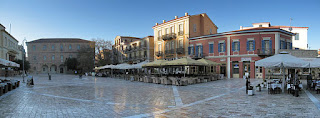Informing Albanians about Arvanites
1)Kolokotronis,
Kanaris, Diakos and Karaiskakis, were not Arvanites.
In
contrast to what many Albanian bloggers and youtubers claim, official sources indicate the particular heroes of the Greek revolution didn't have partially or fully Arvanite ancestry. Kolokotronis,
was from Ramavouni of Messenia, Kanaris was from the island of Psara, Diakos
from Fokhis and Karaiskakis from Skoulikaria, a community in Arta. None of these
communities is recorded to be inhabited by Albanian/Arvanite or other non-Greek
speaking populations. Among these four leaders, only Karaiskakis speaked Albanian, not
because he was an Arvanite himself, but because he was captured by the Albanian Ali
Pasha of Ioannina, and later served his house, where he learned speaking
Albanian.
2) The vast
majority of the revolutionaries were not Arvanites.
Only
Arvanites from hydra and Spetses, As well as Souliotes, according to all
Sources, seem to have contributed well to the Greek revolution.
4)On
contrary, most of the ottoman army that fought in Greece before the Egyptian aid,
was consisted of Albanians. And this army was defeated. In other words,
Albanians were defeated by Greeks (and a few Arvanites) in 1821.
5)
Arvanites are an insignificant minority in Modern Greece.
They
represent not less than 1%, but also not more than 9% of the population (far from the percentages, the
Albanians claim, which are not supported by any Source), with them, according
to anthropological and lately genetic studies, being racially associated with
their Greek compatriots, not with Albanians.
An early
anthropological study proved that most of them belong to the “Aegean”
Mediterranean type, a native Greek dominant type much different from dinaric,
which is the the dominant racial type in Albania. That indicates that most of their
ancestry is from native Greeks in these regions that were linguistically assimilated by the Albanian immigrants
of 13th century, along with Greeks who emigrated in
Arvanite-speaking lands. For example, one of the most common surnames in
Spetses is “Kritikos”, which indicates that Cretans were settled in the island
and were assimilated by Arvanites.
6) Greeks
and Albanians, are two very different nations from each other
In
spite of a few similarities (few similarities which Albanians often focus on), for most of bibliography and common sense in
Europe, we are talking about two very, vey different from each other countries in terms of mentality, culture and Greece is a Mediterranean country, associated with Mediterranean
Southern European countries first, which are part of the West.
Albania
on the other hand, is associated with the Islamic world first, and then with
Eastern Europe, especially with their Balkan Slavic neighbors. Most of Greek
identity (Mentality, Race, culture etc.) is something completely alien to
Albania, as Albanians, as an isolated nation didn’t have contacts with other
parts of the world, except of their close Balkan neighbors (Serbs etc).
Greece on
contrary, always had contacts with other parts of the world, especially through
navy. There were even Greeks in Colombus’ crew, in an period that Albanians
were massively converting to Islam.
7)
Greek presence in Albania as a whole, has always been documented
There
have always been Greek communities in most of Albania, especially in big cities
on the coast. Vlore (Avlon) itself was one of the many Greek colonies in the
coasts of Albania, meanwhile there are sources talking about Greek presence in
Durres, Shkoder etc., all of them assimilated today.
For
example, Two Irish pilgrims who visited Albania on their way to Jerusalem in
1322, reported that Durrës was "inhabited by Latins, Greeks, perfidious
Jews and barbaric Albanians", all of them populations today completely assimilated
into Albanians
Comment: This article should not be taken as offensive towards Albanians, it is just a response to monstrous historical and anthropological distortions, which have been committed by many Albanian nationalists in the internet
Comment: This article should not be taken as offensive towards Albanians, it is just a response to monstrous historical and anthropological distortions, which have been committed by many Albanian nationalists in the internet
Sources
-John L. Comstock, History of the Greek Revolution; compiled from official documents of the Greek Government; and other authentic sources, New York, W.D. Reed, 1828.
-Detorakis,
Turkish rule in Crete, p. 381
-Johann Georg von Hahn (1854), Albaneische Studien
-Alfred Philippson, Zur Ethnographie des Peloponnes ,Pettersmans Mitteilungen
-Handbook of Greece,1918,Naval Staff-Intelligence Division,p.72
Th. K.. Pitsios. Anthropological Study of the Population of the Peloponnese. The Origin of the Peloponnese. Library Anthropological Association of Greece no. 2. Athens, 1978
Read more: http://hellas2010.proboards.com/thread/13/arvanites-8-5-hellas#ixzz4zqflwKW4
Read more: http://hellas2010.proboards.com/thread/13/arvanites-8-5-hellas#ixzz4zqflwKW4
-Lythoxoou,
map of 19th century Arvanite villages
Itinerarium
Symonis Simeonis et Hugonis Illuminatoris ad Terram Sanctam, edited by J.
Nasmith, 1778, cited in: Elsie Robert, The earliest references to the existence
of the Albanian language. Zeitschrift für Balkanologie, Munich, 1991, v. 27.2,
pp. 101–105.

Σχόλια
Δημοσίευση σχολίου